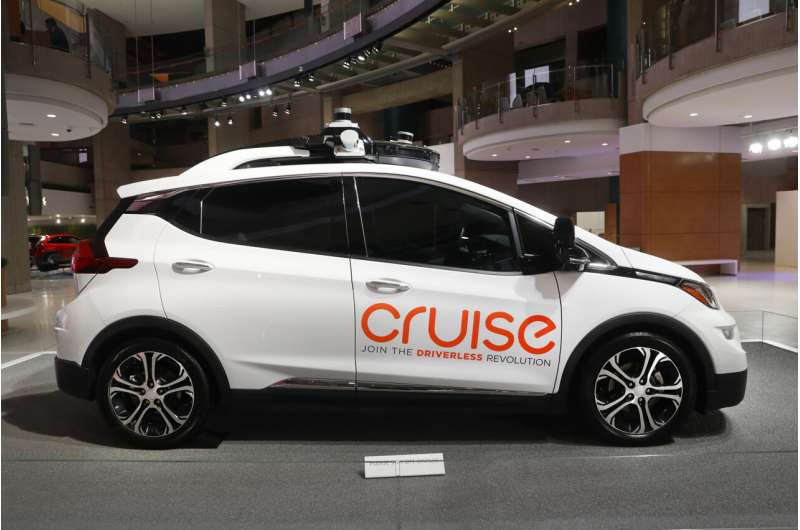This article has been reviewed according to Science X's editorial process and policies. Editors have highlighted the following attributes while ensuring the content's credibility:
fact-checked
reputable news agency
proofread
Cruise, GM's robotaxi service, suspends all driverless operations nationwide

Cruise, the autonomous vehicle unit owned by General Motors, is suspending driverless operations nationwide days after regulators in California found that its driverless cars posed a danger to public safety.
The California Department of Motor Vehicles this week revoked the license for Cruise, which recently began transporting passengers throughout San Francisco.
Cruise is also being investigated by U.S. regulators after receiving reports of potential risks to pedestrians and passengers.
"We have decided to proactively pause driverless operations across all of our fleets while we take time to examine our processes, systems, and tools and reflect on how we can better operate in a way that will earn public trust," Cruise wrote on X, the platform formerly known as Twitter, Thursday night.
The choice to suspend its driverless services isn't related to any new on-road incidents, Cruise added. Human-supervised operations of Cruise's autonomous vehicles, or AVs, will continue—including under California's indefinite suspension.
General Motors Co., which has ambitious goals for Cruise, has taken a significant hit this week. The Detroit automaker had been expecting annual revenue of $1 billion from Cruise by 2025—a big jump from the $106 million in revenue last year.
Cruise has also tested a robotaxi service in Los Angeles, as well as cities like Phoenix and Austin, Texas.
While the California Department of Motor Vehicles didn't elaborate on specific reasons for its suspension of Cruise's license this week, the agency charged Cruise with misrepresenting safety information about the autonomous technology in its vehicles. Tuesday's revocation followed a series of incidents that heightened concerns about the hazards and inconveniences caused by Cruise's robotaxis.
Earlier this month, a Cruise robotaxi notably ran over a pedestrian who had been hit by another vehicle driven by a human. The pedestrian became pinned under a tire of the Cruise vehicle after it came to a stop—and then was pulled for about 20 feet (six meters) as the car attempted to move off the road.
The DMV and others have accused Cruise of not initially sharing all video footage of the accident, but the robotaxi operator pushed back—saying it disclosed the full video to state and federal officials. In a Tuesday statement, Cruise said it cooperating with regulators investigating the Oct. 2 accident—and that its engineers are working on way for its robotaxis to improve their response "to this kind of extremely rare event."
Still, some are skeptical of Cruise's response to the accident and point to lingering questions. Bryant Walker Smith, a University of South Carolina law professor who studies automated vehicles, wants to know "who knew what when?" at Cruise, and maybe GM, following the accident.
Also earlier this month, the National Highway Traffic Safety Administration announced that it was investigating Cruise's autonomous vehicle division after receiving reports of incidents where vehicles may not have used proper caution around pedestrians in roadways, including crosswalks.
The NHTSA's Office of Defects Investigation said it received two reports involving pedestrian injuries from Cruise vehicles. It also identified two additional incidents from videos posted to public websites, noting that the total number is unknown.
In December of last year, the NHSTA opened a separate probe into reports of Cruise's robotaxis that stopped too quickly or unexpectedly quit moving, potentially stranding passengers. Three rear-end collisions that reportedly took place after Cruise AVs braked hard kicked off the investigation.
According to an Oct. 20 letter that was made public Thursday, since beginning this probe the NHSTA has received five other reports of Cruise AVs unexpectedly breaking with no obstacles ahead. Each case involved AVs operating without human supervision and resulted in rear-end collisions.
"We welcome NHTSA's questions related to our safety record and operations," Cruise spokesperson Hannah Lindow said in a statement Friday. "We have cooperated with each of their requests to date as part of the ongoing investigation process and will continue doing so."
Cruise has also previously maintained that its record of driverless miles have outperformed comparable human drivers in terms of safety, notably crash rates.
It's unclear what this week's suspension of driverless operations will mean for Cruise, and perhaps the future for AVs as a whole. Walker Smith notes that there are several possibilities—including distinguishing Cruise's prospects from its competitors, particularly those who haven't expanded as aggressively, or a "Tesla scenario" where initial outrage may not amount to prompt, significant changes.
There could also be larger repercussions for the industry—with this month's news feeding into "the emerging narrative that automated vehicles and their companies are struggling and failing," he said. "Cities like San Francisco, that are already concerned about automated vehicles, (may) see and use this as as proof that that the industry is running amok."
That doesn't mean Cruise won't resume its driverless operations again one day. But it will boil down to what additional information comes out down the road—as well as Cruise identifying specific action items in the near future, Walker Smith added.
"If we can't trust a company deploying automated vehicles, they have no business on our roads," Walker Smith said. He later noted that Cruise's announcement Thursday "expressly referenced earning trust, and I think they need to say what that means."
© 2023 The Associated Press. All rights reserved. This material may not be published, broadcast, rewritten or redistributed without permission.





















